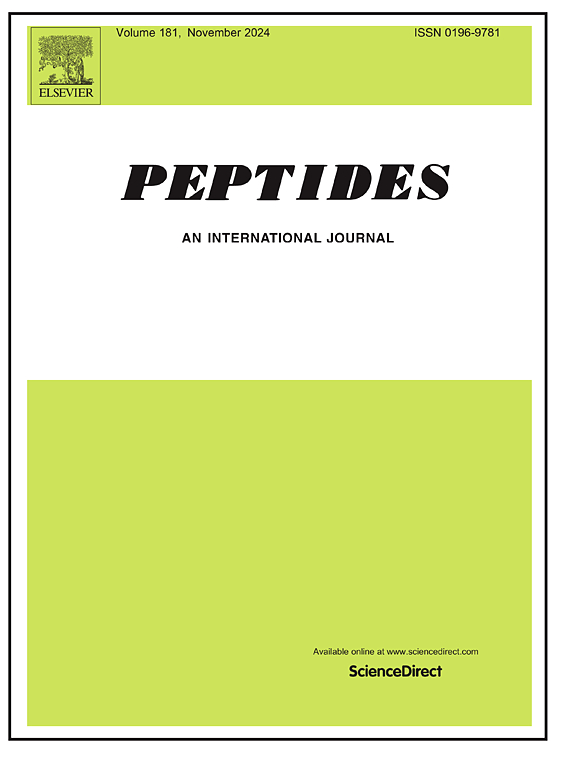The intricate relationship between circadian rhythms and gastrointestinal peptides in obesity
IF 2.9
4区 医学
Q3 BIOCHEMISTRY & MOLECULAR BIOLOGY
引用次数: 0
Abstract
There are different molecular pathways that regulate appetite, particularly the role of the hypothalamus, circadian rhythms, and gastrointestinal peptides. The hypothalamus integrates signals from orexigenic peptides like neuropeptide Y (NPY) and agouti-related protein (AgRP), which stimulate appetite, and anorexigenic peptides such as pro-opiomelanocortin (POMC) and cocaine- and amphetamine-regulated transcript (CART), which promote satiety. These signals are influenced by peripheral hormones like leptin, ghrelin, insulin, and cortisol, as well as gut peptides including glucagon-like peptide-1 (GLP-1), peptide YY (PYY), and cholecystokinin (CCK). The circadian rhythm, regulated by proteins like circadian locomotor output cycles kaput (CLOCK) and brain and muscle ARNT-like 1 (BMAL1), modulates the secretion of these peptides, aligning feeding behaviors with the sleep-wake cycle. In obesity, these regulatory systems are disrupted, leading to leptin resistance, increased ghrelin sensitivity, and altered gut peptide secretion. This results in heightened appetite and impaired satiety, contributing to overeating and metabolic dysfunction. Additionally, circadian disruptions further impair metabolic processes, exacerbating obesity. The present article underscores the importance of understanding the molecular interplay between circadian rhythms and gastrointestinal peptides, particularly in the context of obesity. While some molecular interactions, such as the regulation of GLP-1 and PYY by reverberation of circadian rhythm α (REV-ERBα) and retinoic acid-related orphan receptor α (RORα), are well-established, clinical studies are scarce. Future research is expected to explore these pathways in obesity management, especially with the rise of incretin-based treatments like semaglutide. A deeper understanding of hypothalamic molecular mechanisms could lead to novel pharmacological and non-pharmacological therapies for obesity.
肥胖患者昼夜节律与胃肠肽的复杂关系
有不同的分子途径调节食欲,特别是下丘脑,昼夜节律和胃肠道肽的作用。下丘脑整合来自刺激食欲的神经肽Y (NPY)和agouti相关蛋白(AgRP)等厌氧肽和促进饱腹感的促鸦片黑素皮质素(POMC)和可卡因和安非他明调节转录物(CART)等厌氧肽的信号。这些信号受到瘦素、胃饥饿素、胰岛素和皮质醇等外周激素以及胰高血糖素样肽-1 (GLP-1)、YY肽(PYY)和胆囊收缩素(CCK)等肠道肽的影响。昼夜节律由昼夜运动输出周期衰竭(CLOCK)和大脑和肌肉类arnt样1 (BMAL1)等蛋白质调节,调节这些肽的分泌,使摄食行为与睡眠-觉醒周期保持一致。在肥胖中,这些调节系统被破坏,导致瘦素抵抗,胃饥饿素敏感性增加,肠道肽分泌改变。这会导致食欲增加和饱腹感受损,导致暴饮暴食和代谢功能障碍。此外,昼夜节律紊乱会进一步损害代谢过程,加剧肥胖。本文强调了理解昼夜节律和胃肠道肽之间的分子相互作用的重要性,特别是在肥胖的背景下。虽然一些分子相互作用,如通过昼夜节律α (REV-ERBα)和视黄酸相关孤儿受体α (RORα)的混响调节GLP-1和PYY,已经得到证实,但临床研究很少。未来的研究有望在肥胖管理中探索这些途径,特别是随着以肠促胰岛素为基础的治疗方法(如semaglutide)的兴起。对下丘脑分子机制的深入了解可能会导致新的药物和非药物治疗肥胖。
本文章由计算机程序翻译,如有差异,请以英文原文为准。
求助全文
约1分钟内获得全文
求助全文
来源期刊

Peptides
医学-生化与分子生物学
CiteScore
6.40
自引率
6.70%
发文量
130
审稿时长
28 days
期刊介绍:
Peptides is an international journal presenting original contributions on the biochemistry, physiology and pharmacology of biological active peptides, as well as their functions that relate to gastroenterology, endocrinology, and behavioral effects.
Peptides emphasizes all aspects of high profile peptide research in mammals and non-mammalian vertebrates. Special consideration can be given to plants and invertebrates. Submission of articles with clinical relevance is particularly encouraged.
 求助内容:
求助内容: 应助结果提醒方式:
应助结果提醒方式:


